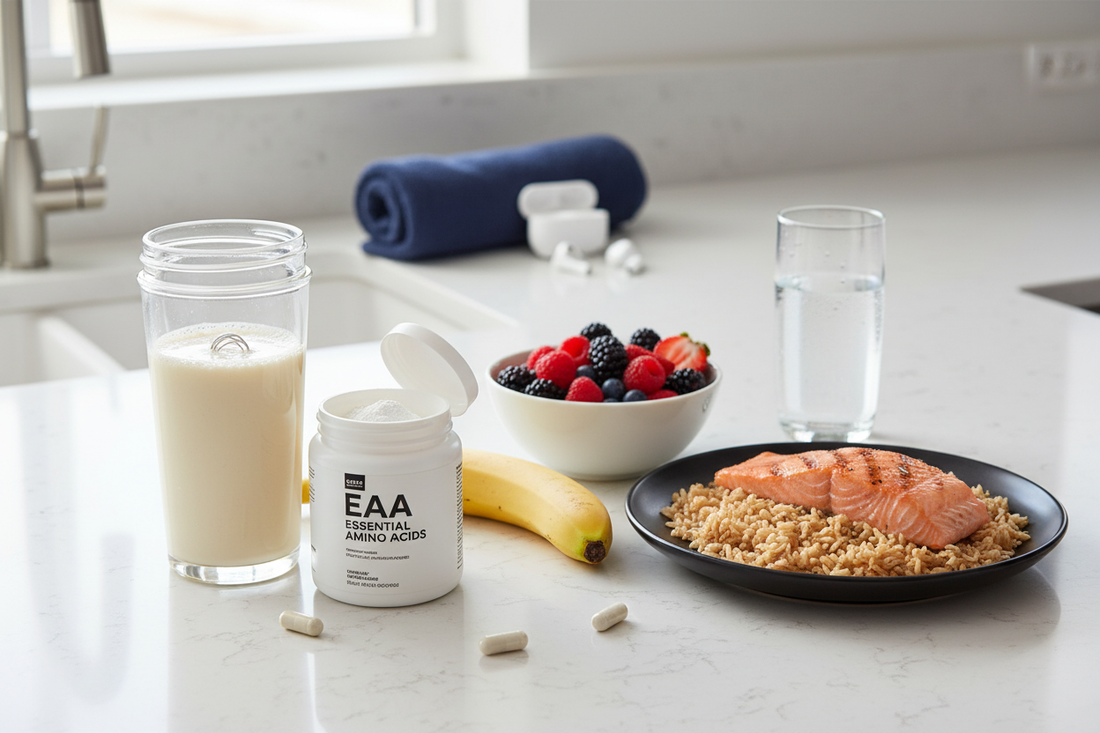
EAAs for your optimal muscle regeneration
The Importance of Proper Nutrition After Training
The time after training is crucial for your progress. A well-thought-out nutrition strategy can make the difference between a long recovery time and a quick regeneration. The right muscle recovery nutrition helps your body repair damaged muscle tissue and replenish energy reserves. Regardless of whether you train regularly or only occasionally do sports, targeted nutrients can significantly shorten your recovery time and increase your performance.
Protein: The Foundation of Muscle Repair
Proteins are the basic building blocks for muscle regeneration. After intensive training, microscopically small tears occur in your muscle fibers. To repair these, your body needs sufficient amino acids, the building blocks of proteins.
Complete vs. Incomplete Proteins: What Your Muscles Really Need
Complete proteins contain all nine essential amino acids that your body cannot produce itself. Animal products such as eggs, dairy products, and meat provide complete proteins. Plant-based sources such as legumes or grains often only contain incomplete proteins, which should be cleverly combined.
Essential amino acids (EAAs) are particularly important for muscle regeneration, as they directly contribute to protein synthesis. Essential amino acid supplements can shorten recovery time and accelerate muscle repair, especially when taken immediately after training.
Carbohydrates: Replenishing your energy stores
Carbohydrates also play an important role in recovery after training. They replenish the glycogen stores in your muscles that were used up during training.
Timing of carbohydrate intake for optimal glycogen replenishment
The 30-60 minute window after training is ideal for carbohydrate intake. During this phase, your body is particularly receptive and can utilize nutrients more effectively. Quickly digestible carbohydrates such as bananas, rice, or sports drinks are particularly effective for muscle recovery nutrition during this period.
Micronutrients that accelerate recovery
In addition to macronutrients, vitamins and minerals also play a crucial role in muscle regeneration:
Magnesium supports muscle function and reduces cramps.
Vitamin D promotes muscle regeneration and bone strength.
Zinc is important for protein synthesis and the immune system.
B vitamins support energy metabolism.
Anti-inflammatory foods for muscle soreness
Certain foods have natural anti-inflammatory properties that can relieve muscle soreness after exercise:
Berries contain antioxidants that reduce inflammation.
Oily fish such as salmon provide omega-3 fatty acids.
Turmeric contains curcumin, which has a strong anti-inflammatory effect.
Ginger can reduce muscle soreness after intense training.
The key to successful training lies in regeneration.
Prioritizing the right muscle recovery nutrition is just as important as the training itself. The combination of sufficient protein, strategically used carbohydrates, and regeneration-promoting micronutrients creates the perfect formula for post-workout recovery.
Start implementing these nutritional strategies today to feel stronger tomorrow and make continuous progress on your fitness journey. Remember: your muscles don't grow during training, but during the recovery phase afterwards. With the right nutrition, you can optimally support this process and achieve your fitness goals faster.
